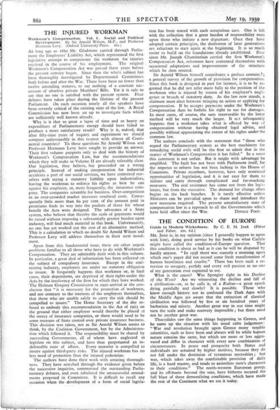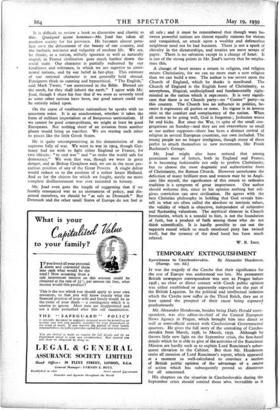THE CONDITION OF EUROPE
Mn. JOAD is, in my opinion (since I generally happen to agree with him), doing good service by his books on what Carlyle might have called the condition-of-Europe question. That this condition is about as bad as it can be will be disputed by hardly anyone. "In 1938 there was scarcely a morning upon which one's paper did not record some fresh manifestation of human beastliness and cruelty." There has been such a re- version to savagery, perfidy and every evil passion as no one of my generation ever expected to see.
What is the cause? Was Spengler right in his Decline of the West? Are we witnessing the decline and fall of a civilisation—or, as he calls it, of a Ku/tur—a great epoch dying painfully and slowly? It is possible. Those who know enough history not to confound the Dark Ages with the Middle Ages are aware that the extinction of classical civilisation was followed by five or six hundred years of barbarism and misery. Another great war in our time might turn the scale and make recovery impossible ; but there need not be another great war.
Thucydides saw the same things happening in Greece, and he sums up the situation with his usual calm judgement: "War and revolution brought upon Greece many terrible calamities, such as have been and always will be while human nature remains the same, but which are more or less aggra- vated and differ in character with every new combination of circumstances. In peace and prosperity both States and individuals are actuated by higher motives, because they do not fall under the dominion of tyrannous necessities ; but war, which takes away the comfortable provision of daily life; is a hard master, and tends' to assimilate men's characters to their conditions." The north-western European group, and its offshoots beyond the seas, have hitherto escaped the full blast of these demoralising conditions, which have made the rest of the Continent what we see it today.
It is difficult to review a book so discursive and chaotic as this. Quid quid aguru homines—Mr. Joad has taken all modem society for his province. He becomes almost petu- lant ovu the defacement of the beauty of our country, and the barbaric noisiness and vulgarity of modern life. We are, he thinks, as a nation, wilfully ignorant as well as naturally stupid; in France civilisation goes much further down the social scale. Our character is partially redeemed by our kindliness and tolerance, in which we are superior to conti- nental nations, and by our belief in fair-play. This estimate of our national character is not generally held abroad. Foreigners think us cunning and hypocritical. "The English," said Mark Twain, "are mentioned in the Bible. Blessed are the meek, for they shall inherit the earth." I agree with Mr. Joad, though I share his fear that if we were as severely tried as some other nations have been, our good nature could not be entirely relied upon.
On the curse of totalitarian nationalism he speaks with no uncertain voice. It is an anachronism, whether it takes the form of militant imperialism or of fissiparous sectionalism. If we cannot be good cosmopolitans, we might at least be good Europeans. But nothing short of an invasion from another planet would bring us together. We are tearing each other to pieces like the little Greek States.
He is quite uncompromising in his denunciation of the supreme folly of war. We went to war in 1914, though Ger- many had no wish to fight either England or France, for two objects: "to end war" and "to make the world safe for democracy." We won that war, though we were in great danger, and as Bishop Creighton said, we are in the most pre- carious position of any of the Great Powers. A single defeat would reduce us to the position of a rather larger Holland. And as for the objects for which we fought, surely no more complete disillusionment was ever recorded in history.
Mr. Joad even goes the length of suggesting that if we frankly renounced war as an instrument of policy, and dis- armed ourselves, we should be "as safe as Denmark." But Denmark and the other small States of Europe do not feel at
all safe ; and it must be remembered that though wars be- tween powerful nations are almost equally ruinous for victors and vanquished, an attack upon a wealthy and defenceless neighbour need not be bad business. There is not a spark of chivalry in the dictatorships, and treaties are mere scraps of paper. There is no salvation except in a change of heart. It is one of the strong points in Mr. load's survey that he empha- sises this.
A change of heart means a return to religion, and religion means Christianity, for we can no more start a new religion than we can build a tree. The author is too severe upon the Church of England, which he thinks is moribund. The Church of England is the English form of Christianity, as amorphous, illogical, undisciplined and fundamentally right- minded as the nation which it represents. It is very signifi- cant that there is no Church party—no " Centre " party—in this country. The Church has no influence in politics, be- cause it represents all parties or none. Its vigour is in inverse ratio to the- comfort and complacency of the nation. When all seems to be going well, God is forgotten ; Jeshuzun waxes fat and kicks. But since the War, in spite of the small con- gregations on Sunday—and they are not everywhere so small as our author supposes—there has been a distinct revival of religion in several European countries, our own included. The young people are no longer irreligious, though many of them prefer to attach themselves to new movements, like Frank Buchman's Groups.
Mr. Joad might also have noticed that among prominent men of letters, both in England and France, it is becoming fashionable not only to profess Christianity, but to choose the most dogmatic and authoritative form of Christianity, the Roman Church. However unwelcome the defection of many brilliant men and women may be to Angli- cans like myself, the significance of this return to orthodox tradition is a symptom of great importance. Our author should welcome this, since in his opinion nothing but reli- gious conviction can save civilisation. He agrees with the best Christian philosophy in holding that God reveals him- self in what are often called the absolute or intrinsic values, the validity of which is objective, independent of subjective and fluctuating valuations. The mythical element in Church formularies, which is a scandal to him, is not the foundation of faith, but a product of faith among those who do not think scientifically. It is hardly possible to cut out the supports round which so much emotional piety has twined itself, but the tyranny of the dead hand has been much relaxed.
W. R. INGE.



















































 Previous page
Previous page